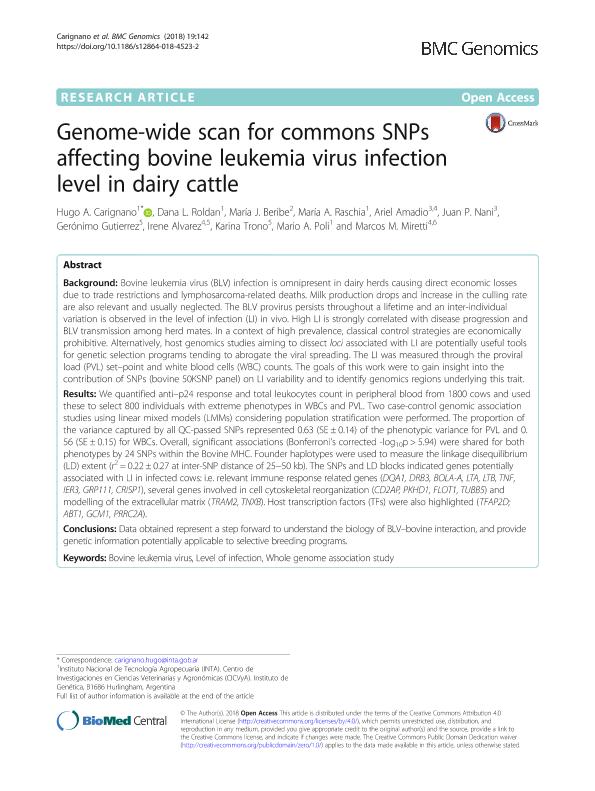Mostrar el registro sencillo del ítem
dc.contributor.author
Carignano, Hugo Adrián

dc.contributor.author
Roldan, Dana L.
dc.contributor.author
Beribe, María José

dc.contributor.author
Raschia, Maria Agustina

dc.contributor.author
Amadio, Ariel Fernando

dc.contributor.author
Nani, Juan Pablo

dc.contributor.author
Gutiérrez, Gerónimo

dc.contributor.author
Alvarez, Irene

dc.contributor.author
Trono, Karina Gabriela

dc.contributor.author
Poli, Mario Andres

dc.contributor.author
Miretti, Marcos Mateo

dc.date.available
2019-12-10T18:37:24Z
dc.date.issued
2018-02
dc.identifier.citation
Carignano, Hugo Adrián; Roldan, Dana L.; Beribe, María José; Raschia, Maria Agustina; Amadio, Ariel Fernando; et al.; Genome-wide scan for commons SNPs affecting bovine leukemia virus infection level in dairy cattle; BioMed Central; BMC Genomics; 19; 142; 2-2018; 1-15
dc.identifier.issn
1471-2164
dc.identifier.uri
http://hdl.handle.net/11336/91933
dc.description.abstract
Background: Bovine leukemia virus (BLV) infection is omnipresent in dairy herds causing direct economic losses due to trade restrictions and lymphosarcoma-related deaths. Milk production drops and increase in the culling rate are also relevant and usually neglected. The BLV provirus persists throughout a lifetime and an inter-individual variation is observed in the level of infection (LI) in vivo. High LI is strongly correlated with disease progression and BLV transmission among herd mates. In a context of high prevalence, classical control strategies are economically prohibitive. Alternatively, host genomics studies aiming to dissect loci associated with LI are potentially useful tools for genetic selection programs tending to abrogate the viral spreading. The LI was measured through the proviral load (PVL) set-point and white blood cells (WBC) counts. The goals of this work were to gain insight into the contribution of SNPs (bovine 50KSNP panel) on LI variability and to identify genomics regions underlying this trait. Results: We quantified anti-p24 response and total leukocytes count in peripheral blood from 1800 cows and used these to select 800 individuals with extreme phenotypes in WBCs and PVL. Two case-control genomic association studies using linear mixed models (LMMs) considering population stratification were performed. The proportion of the variance captured by all QC-passed SNPs represented 0.63 (SE±0.14) of the phenotypic variance for PVL and 0.56 (SE±0.15) for WBCs. Overall, significant associations (Bonferroni´s corrected -log10p>5.94) were shared for both phenotypes by 24 SNPs within the Bovine MHC. Founder haplotypes were used to measure the linkage disequilibrium (LD) extent (r2=0.22±0.27 at inter-SNP distance of 25-50 kb). The SNPs and LD blocks indicated genes potentially associated with LI in infected cows: i.e. relevant immune response related genes (DQA1, DRB3, BOLA-A, LTA, LTB, TNF, IER3, GRP111, CRISP1), several genes involved in cell cytoskeletal reorganization (CD2AP, PKHD1, FLOT1, TUBB5) and modelling of the extracellular matrix (TRAM2, TNXB). Host transcription factors (TFs) were also highlighted (TFAP2D; ABT1, GCM1, PRRC2A). Conclusions: Data obtained represent a step forward to understand the biology of BLV-bovine interaction, and provide genetic information potentially applicable to selective breeding programs.
dc.format
application/pdf
dc.language.iso
eng
dc.publisher
BioMed Central

dc.rights
info:eu-repo/semantics/openAccess
dc.rights.uri
https://creativecommons.org/licenses/by-nc-sa/2.5/ar/
dc.subject
BOVINE LEUKEMIA VIRUS
dc.subject
LEVEL OF INFECTION
dc.subject
WHOLE GENOME ASSOCIATION STUDY
dc.subject.classification
Ciencias Veterinarias

dc.subject.classification
Ciencias Veterinarias

dc.subject.classification
CIENCIAS AGRÍCOLAS

dc.title
Genome-wide scan for commons SNPs affecting bovine leukemia virus infection level in dairy cattle
dc.type
info:eu-repo/semantics/article
dc.type
info:ar-repo/semantics/artículo
dc.type
info:eu-repo/semantics/publishedVersion
dc.date.updated
2019-10-18T15:48:32Z
dc.journal.volume
19
dc.journal.number
142
dc.journal.pagination
1-15
dc.journal.pais
Reino Unido

dc.journal.ciudad
Londres
dc.description.fil
Fil: Carignano, Hugo Adrián. Instituto de Genética; Argentina. Instituto Nacional de Tecnología Agropecuaria; Argentina
dc.description.fil
Fil: Roldan, Dana L.. Instituto de Genética; Argentina. Instituto Nacional de Tecnología Agropecuaria; Argentina
dc.description.fil
Fil: Beribe, María José. Instituto Nacional de Tecnología Agropecuaria. Centro Regional Buenos Aires; Argentina
dc.description.fil
Fil: Raschia, Maria Agustina. Instituto Nacional de Tecnología Agropecuaria. Centro Regional Buenos Aires; Argentina. Instituto de Genética; Argentina. Consejo Nacional de Investigaciones Científicas y Técnicas; Argentina
dc.description.fil
Fil: Amadio, Ariel Fernando. Instituto Nacional de Tecnología Agropecuaria. Centro Regional Santa Fe. Estación Experimental Agropecuaria Rafaela; Argentina. Consejo Nacional de Investigaciones Científicas y Técnicas. Centro Científico Tecnológico Conicet - Santa Fe; Argentina
dc.description.fil
Fil: Nani, Juan Pablo. Instituto Nacional de Tecnología Agropecuaria. Centro Regional Santa Fe. Estación Experimental Agropecuaria Rafaela; Argentina
dc.description.fil
Fil: Gutiérrez, Gerónimo. Instituto Nacional de Tecnología Agropecuaria; Argentina. Consejo Nacional de Investigaciones Científicas y Técnicas; Argentina
dc.description.fil
Fil: Alvarez, Irene. Instituto Nacional de Tecnología Agropecuaria. Centro Regional Buenos Aires; Argentina. Consejo Nacional de Investigaciones Científicas y Técnicas; Argentina
dc.description.fil
Fil: Trono, Karina Gabriela. Consejo Nacional de Investigaciones Científicas y Técnicas; Argentina. Instituto Nacional de Tecnología Agropecuaria; Argentina
dc.description.fil
Fil: Poli, Mario Andres. Instituto Nacional de Tecnología Agropecuaria. Centro Regional Buenos Aires; Argentina
dc.description.fil
Fil: Miretti, Marcos Mateo. Instituto Nacional de Tecnología Agropecuaria. Centro Regional Buenos Aires; Argentina. Consejo Nacional de Investigaciones Científicas y Técnicas; Argentina
dc.journal.title
BMC Genomics

dc.relation.alternativeid
info:eu-repo/semantics/altIdentifier/url/https://bmcgenomics.biomedcentral.com/articles/10.1186/s12864-018-4523-2
dc.relation.alternativeid
info:eu-repo/semantics/altIdentifier/doi/https://doi.org/10.1186/s12864-018-4523-2
Archivos asociados
